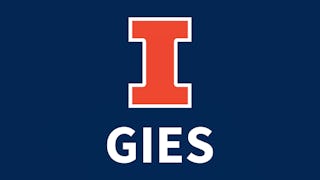In this course, you’ll learn the basic fundamentals of corporate finance. Based on the pre-term qualifying courses for Wharton MBA students, Professor Jessica Wachter has designed this course for learners who need a refresher in financial concepts, or for those who are learning about corporate finance for the first time. You’ll identify foundational concepts in corporate finance, such as NPV, Compound and Simple Interest, and Annuities versus Perpetuities. You’ll also learn how to apply the NPV framework to calculating fixed-income valuation and Equity, using hypothetical examples of corporate projects. By the end of this course, you’ll have honed your skills in calculating risk and returns to optimize investments, and be able to assess the right set of financial information to achieve better returns for your firm.

Enjoy unlimited growth with a year of Coursera Plus for $199 (regularly $399). Save now.

Fundamentals of Finance
This course is part of Introduction to Finance and Accounting Specialization

Instructor: Jessica Wachter
123,849 already enrolled
Included with
(1,101 reviews)
Skills you'll gain
Details to know

Add to your LinkedIn profile
9 assignments
See how employees at top companies are mastering in-demand skills

Build your subject-matter expertise
- Learn new concepts from industry experts
- Gain a foundational understanding of a subject or tool
- Develop job-relevant skills with hands-on projects
- Earn a shareable career certificate

There are 5 modules in this course
This module was designed to give you foundational knowledge of corporate finance and the Net Present Value (NPV). You’ll identify the definition of both Present Value and NPV, why it works, and how to calculate the NPV. You’ll learn key concepts such as Separation Theorem, whether corporations should follow the same rules of NPV as individuals, and what are reasonable assumptions to make when calculating NPV. You’ll compare Compound versus Simple Interest, define important concepts such as Annuities and Perpetuities, and analyze Annual Percentage Rate (APR) and Effective Annual Interest Rate (EAR). By the end of this module, you’ll gain a better understanding of the fundamental concepts in corporate finance as well as broader knowledge regarding the factors that go into a firm’s most critical decision-making.
What's included
8 videos6 readings2 assignments
In this module, you’ll examine fixed income valuation and delve deeper into the yield curve. Using the basic definition of bonds, you’ll be able to identify zero coupon bonds and calculate the return on those bonds. You’ll also discuss the differences between Yield to Maturity and Holding Period Returns, evaluate your investments, and be able to answer the question: “What does return on investment mean?” Through analyzing the Yield Curve, you’ll assess the opportunity cost of receiving money at various events in the future and accurately value investments. By the end of this module, you’ll be able to describe what a bond and zero coupon bond is, calculate the return on those bonds, and calculate a Yield Curve to better assess the value of your investments.
What's included
6 videos4 readings2 assignments
In this module, you’ll examine how to determine the value of stocks using present value methods. You’ll define what Equity is and develop an understanding of the important difference between fixed-income securities, such as bonds, and equity cash flows. You’ll discover the standard approach in valuing equity through its cash flow and how the principle of using multiples (such as price-earnings ratio) to value equity all comes from valuing equity as a stream of cash flows. By the end of this module, you’ll gain a better understanding of the theoretical basis behind applications of equity valuation and create models that determine dividend growth.
What's included
3 videos4 readings2 assignments
This module was designed to show you the difference between NPV and Internal Rate of Return (IRR). You’ll first explore both Internal Rate of Return and how it compares to the NPV, then debunk some of the common assumptions about IRR that may seem unrealistic when examined closely. Using hypothetical examples of projects, you’ll compare the values of NPV and IRR and what to do when they agree or disagree with each other. By the end of this module, you’ll gain a better understanding of the difference between NPV and IRR, plus be able to determine when to make the critical call on which value to accept or reject when making important decisions within your firm.
What's included
4 videos2 readings2 assignments
This module contains additional course topics related to the fundamentals of finance
What's included
9 readings1 assignment
Earn a career certificate
Add this credential to your LinkedIn profile, resume, or CV. Share it on social media and in your performance review.
Instructor

Offered by
Explore more from Finance
 Status: Free Trial
Status: Free TrialUniversity of Pennsylvania
 Status: Free Trial
Status: Free TrialUniversity of California, Irvine
 Status: Preview
Status: PreviewUniversity of Illinois Urbana-Champaign
 Status: Free Trial
Status: Free TrialRice University
Why people choose Coursera for their career




Learner reviews
1,101 reviews
- 5 stars
51.13%
- 4 stars
20.43%
- 3 stars
11.62%
- 2 stars
6.72%
- 1 star
10.08%
Showing 3 of 1101
Reviewed on Apr 26, 2022
Great course, easy simple explanation. Would be great if after every assignment we can have access to solutions as questions are challenging. Otherwise a good course for a beginner.
Reviewed on Jan 23, 2021
Helpful course with clear lectures by Dr. Wachter. The quizzes were a bit frustrating in their specific formatting requirements.
Reviewed on Dec 12, 2021
Some exercises could use a few hints, aside from that looks very good. The notes are good even for someone who is very rusty in algebra.

Open new doors with Coursera Plus
Unlimited access to 10,000+ world-class courses, hands-on projects, and job-ready certificate programs - all included in your subscription
Advance your career with an online degree
Earn a degree from world-class universities - 100% online
Join over 3,400 global companies that choose Coursera for Business
Upskill your employees to excel in the digital economy
Frequently asked questions
To access the course materials, assignments and to earn a Certificate, you will need to purchase the Certificate experience when you enroll in a course. You can try a Free Trial instead, or apply for Financial Aid. The course may offer 'Full Course, No Certificate' instead. This option lets you see all course materials, submit required assessments, and get a final grade. This also means that you will not be able to purchase a Certificate experience.
When you enroll in the course, you get access to all of the courses in the Specialization, and you earn a certificate when you complete the work. Your electronic Certificate will be added to your Accomplishments page - from there, you can print your Certificate or add it to your LinkedIn profile.
Yes. In select learning programs, you can apply for financial aid or a scholarship if you can’t afford the enrollment fee. If fin aid or scholarship is available for your learning program selection, you’ll find a link to apply on the description page.
More questions
Financial aid available,

